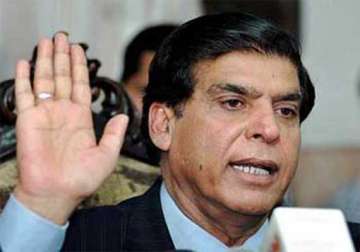Islamabad, Aug 20 : Ahead of the August 27 deadline for him to appear before the Supreme Court, Pakistan Premier Raja Pervez Ashraf has been advised by his legal experts and senior leaders of ruling PPP not to be present there to face a contempt charge for refusing to reopen graft cases against the President.
Attorney General Irfan Qadir, who is against the Premier's appearance before a five-judge bench led by Justice Asif Saeed Khosa, has advised Ashraf that he is not constitutionally or legally bound to be present in court, The News quoted a source as saying.
“Had I been the adviser to former Prime Minister Yousuf Raza Gilani, I would have never recommended to him to present himself before the bench that held hearings on the contemptcharge against him,” the Attorney General was quoted as saying by the daily.
Gilani, who was disqualified by the apex court in June after being convicted of contempt for refusing to revive graft charges against President Asif Ali Zardari in Switzerland, too is averse to Ashraf appearing in court for the contempt proceedings.
He has said he got nothing out of his three appearances in court on the same charge.
Gilani has asked Ashraf not to go to the Supreme Court on August 27 as he is not answerable to it for his actions as the Premier, the report said.
Punjab Governor Latif Khosa, among the critics of the superior judiciary, is another top PPP leader who is opposed to the Premier's appearance in court.He made this recommendation during meetings with Ashraf.
The report said experts had advised the Premier to stay away from the court on August 27 as he is immune from prosecution under Clause 1 of Article 248 of the Constitution.
While Ashraf is not likely to appear before the bench, the Attorney General and Law Minister Farooq Naek gave an impression to the apex court last week that the government is about to come up with a mutually acceptable solution to the standoff.
They sought time to finalise the solution. They sought the postponement of the proceedings in the contempt case but the bench made it clear that the case would go ahead as scheduled.
The Supreme Court has been pressuring the government to revive the cases against the President since December 2009, when it struck down a graft amnesty that benefited Zardari and over 8,000 others.
The government has refused to act, saying the President enjoys immunity in Pakistan and abroad.
Latest World News
